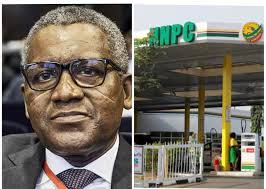In a significant development for Nigeria’s oil industry, the Nigerian National Petroleum Company Limited (NNPCL) has announced that it has purchased premium motor spirit (PMS), commonly known as petrol, from Dangote Refinery at a price of N898 per litre. This revelation comes as part of NNPCL’s ongoing efforts to secure fuel supplies amid the country’s fluctuating oil market.
On Saturday, NNPCL mobilized approximately 300 trucks to the Dangote Refinery, which boasts a capacity of 650,000 barrels per day, located in Lagos. The loading of fuel commenced on Sunday, marking a crucial step in the collaboration between the state-owned oil firm and the private refinery.
In an exclusive interview with Daily Trust, Olufemi Soneye, Chief Spokesperson for NNPCL, clarified the pricing details, stating, “We successfully loaded PMS at the Dangote Refinery today. The claim that we purchased it at N760 per litre is incorrect. For this initial loading, the price from the refinery was N898 per litre.” As of the latest update, over 70 trucks had already been loaded with the fuel, indicating a robust start to this new partnership.
This move is expected to have significant implications for the Nigerian fuel market, particularly in addressing the ongoing challenges of fuel scarcity and pricing inconsistencies. By sourcing fuel directly from Dangote Refinery, NNPCL aims to stabilize supply and potentially reduce the burden of high fuel prices on consumers.
The collaboration also highlights the growing role of private sector players in Nigeria’s oil and gas industry, as the Dangote Refinery positions itself as a key supplier in the market. As the country navigates its energy needs, this partnership could pave the way for more strategic alliances that enhance fuel availability and affordability for Nigerians.
As the situation develops, stakeholders in the oil sector and consumers alike will be keenly watching the impacts of this new pricing structure and the overall effectiveness of the NNPCL’s strategy to secure fuel supplies from domestic sources.


